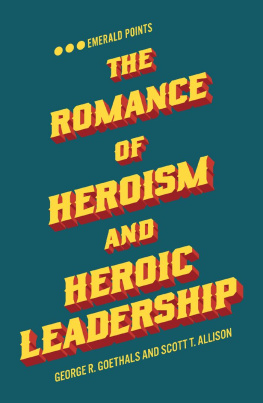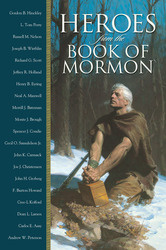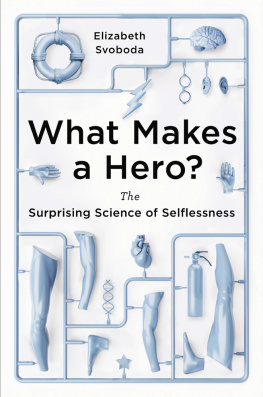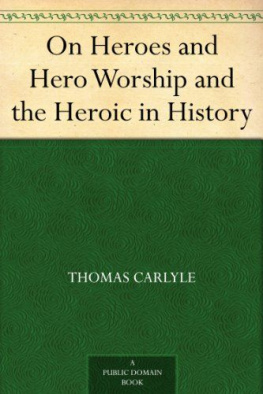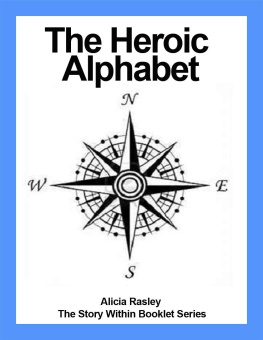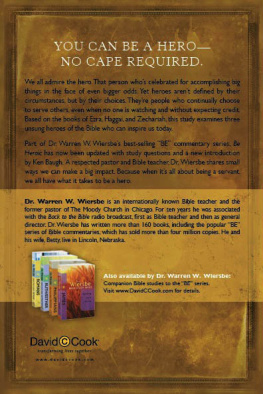Atwood Sara - On Heroes, Hero-Worship, and the Heroic in History
Here you can read online Atwood Sara - On Heroes, Hero-Worship, and the Heroic in History full text of the book (entire story) in english for free. Download pdf and epub, get meaning, cover and reviews about this ebook. City: New Haven, year: 2013, publisher: Yale University Press, genre: Science. Description of the work, (preface) as well as reviews are available. Best literature library LitArk.com created for fans of good reading and offers a wide selection of genres:
Romance novel
Science fiction
Adventure
Detective
Science
History
Home and family
Prose
Art
Politics
Computer
Non-fiction
Religion
Business
Children
Humor
Choose a favorite category and find really read worthwhile books. Enjoy immersion in the world of imagination, feel the emotions of the characters or learn something new for yourself, make an fascinating discovery.

- Book:On Heroes, Hero-Worship, and the Heroic in History
- Author:
- Publisher:Yale University Press
- Genre:
- Year:2013
- City:New Haven
- Rating:4 / 5
- Favourites:Add to favourites
- Your mark:
- 80
- 1
- 2
- 3
- 4
- 5
On Heroes, Hero-Worship, and the Heroic in History: summary, description and annotation
We offer to read an annotation, description, summary or preface (depends on what the author of the book "On Heroes, Hero-Worship, and the Heroic in History" wrote himself). If you haven't found the necessary information about the book — write in the comments, we will try to find it.
Atwood Sara: author's other books
Who wrote On Heroes, Hero-Worship, and the Heroic in History? Find out the surname, the name of the author of the book and a list of all author's works by series.
On Heroes, Hero-Worship, and the Heroic in History — read online for free the complete book (whole text) full work
Below is the text of the book, divided by pages. System saving the place of the last page read, allows you to conveniently read the book "On Heroes, Hero-Worship, and the Heroic in History" online for free, without having to search again every time where you left off. Put a bookmark, and you can go to the page where you finished reading at any time.
Font size:
Interval:
Bookmark:
Rethinking the Western Tradition
The volumes in this series seek to address the present debate over the Western tradition by reprinting key works of that tradition along with essays that evaluate each text from different perspectives.
EDITORIAL
COMMITTEE FOR
Rethinking the Western Tradition
David Bromwich
Yale University
Gerald Graf
University of Illinois at Chicago
Gary Saul Morson
Northwestern University
Ian Shapiro
Yale University
Steven B. Smith
Yale University
THOMAS CARLYLE
Edited by
David R. Sorensen and Brent E. Kinser
with essays by
Sara Atwood
Owen Dudley Edwards
Christopher Harvie
Brent E. Kinser
Terence James Reed
David R. Sorensen
Beverly Taylor
Yale
UNIVERSITY PRESS
New Haven and London
Copyright 2013 by Yale University.
All rights reserved.
This book may not be reproduced, in whole or in part, including illustrations, in any form (beyond that copying permitted by Sections 107 and 108 of the U.S. Copyright Law and except by reviewers for the public press), without written permission from the publishers.
Yale University Press books may be purchased in quantity for educational, business, or promotional use. For information, please e-mail sales.press@yale.edu (U.S. office) or sales@yaleup.co.uk (U.K. office).
Set in Times Roman type by Keystone Typesetting, Inc.
Printed in the United States of America.
Library of Congress Cataloging-in-Publication Data
On heroes, hero-worship, and the heroic in history / Thomas Carlyle ; edited by
David R. Sorensen and Brent E. Kinser ; with essays by Sara Atwood,
Owen Dudley Edwards, Christopher Harvie, Brent E. Kinser, Terence James Reed,
David R. Sorensen, Beverly Taylor.
Pages cm (Rethinking the Western tradition)
Includes bibliographical references and index.
ISBN 978-0-300-14860-2 (pbk.)
1. Heroes. 2. Hero worship. I. Sorensen, David R., 1953 editor of compilation.
II. Kinser, Brent E., editor of compilation. III. Carlyle, Thomas, 17951881.
On heroes, hero-worship, and the heroic in history.
PR 4426. A 2 S 67 2013
824.8dc23
2012045115
A catalogue record for this book is available from the British Library.
This paper meets the requirements of ANSI/NISO Z39.48-1992 (Permanence of Paper).
10 9 8 7 6 5 4 3 2 1
For Fielding, DeLaura, and apRoberts
Flowing Light-Fountains
The Tone of the Preacher: Carlyle as Public Lecturer in On Heroes, Hero-Worship, and the Heroic in History
by Owen Dudley Edwards
DAVID R. SORENSEN
The other sect (to which I belong) look upon hero-worship as no better than any other idolatry, and upon the attitude of mind of the hero-worshipper as essentially immoral.
T. H. Huxley to Charles Kingsley, 8 Nov. 1866, concerning
charges of criminality against Governor John Eyre of Jamaica;
Life and Letters 1:304
My dear young friend, said Mustapha Mond, civilization has absolutely no need of nobility or heroism. These things are symptoms of political inefficiency. In a properly organized society like ours, nobody has any opportunities for being noble or heroic.
Aldous Huxley, Brave New World (1932) 161
In a striking example of what Thomas Carlyle called a conflux of two Eternities (Signs of the Times [1829], Works 27:59), the fate of On Heroes, Hero-Worship, and the Heroic in History (1841) has closely paralleled that of his own reputation in the twenty-first century. Today neither Carlyle nor his book is widely known among students of English literature. However unfairly, both have been tarnished by their association with the authoritarian and totalitarian personality cults that brought European civilization to the brink of destruction in World War II and that left what Michael Burleigh has called a dystopian stain (xi) on the historical record. Renowned in the early Victorian period as the indomitable opponent of mechanistic social engineering, Carlyle later became implicated in its worst excesses. Significantly, in Culture and Society (1958)the boldest and most successful attempt to revive Carlyles standing as a prophetRaymond Williams referred to Heroes and Hero-Worship as a turning point in the authors career, signaling his steady withdrawal from genuinely social thinking into the preoccupations with personal power (83).
Carlyles contemporaries themselves were equally dismayed by the direction his thinking took in the wake of this withdrawal. His notorious slurs on Africans, Jews, Irish Catholics, and Poles, his equivocal support of the Confederacy in the American Civil War, his adulation of Prussian militarism, and his defense of Governor John Eyres brutal suppression of the Jamaican revolt in 1866 offended those who had been moved by his earlier polemics against laissez-faire economics and his tenacious prosecution of the Condition of England question. His reputation reached its nadir in early 1945, when in his diary Joseph Goebbels cited Carlyles History of Frederick the Great (185865) as Adolf Hitlers chief source of solace during his final months in the Berlin bunker. Never again was the Sage of Chelsea readily identified with the cause of common humanity. Like the Prussian state that he revered, Carlyle, the prophet recognized by Williams as qualified to become the most important social thinker of his century (76), effectively ceased to exist as an intellectual force in the years after the war.
Hero-worship itself has followed a similar downward trajectory. The trend began in the period following the Great Warthe war that was to have prevented World War II and all other warswhen what Paul Fussell called the static world of Victorian morality, with its seemingly permanent and reliable (21) abstractions, began to unravel as the enormity of the conflict became apparent. Later in the century, in the wake of the catastrophic experiments in human transformation that traumatized societies as politically and culturally diverse as China, Cambodia, Germany, Iraq, Libya, North Korea, Romania, and the Soviet Union in the twentieth centuryexperiments conducted to exalt the supreme wisdom of transcendent leadersskepticism toward heroic avatars became more deeply entrenched in Western thought. Summarizing this consensus at the outset of a new millennium, Lucy Hughes-Hallett argued that the notion of the herothat some men are born specialis radically inegalitarian. It can open the way for tyranny. She goes on to point out that hero-worship allows worshippers to abnegate responsibility, looking to the great man for salvation or for fulfilment that they should more properly be working to accomplish for themselves (3). To those who complained about the triviality of modern life, Hughes-Hallett bluntly responded that the dominance of popular culture was a necessary consequence of a more democratic society. Modern triviality, however dispiriting, was far less hazardous to the body politic than the desperation that prompts people to crave a champion, a protector, or a redeemer and, having identified one, to offer him their worship (2).
Despite the influential efforts of philosophers such as Hannah Arendt and John Rawls to enshrine equality as the highest social good by arguing for the inherent dignity of all human beings, dissenters continue to press the case for heroic distinction. Robert Faulkner, a shrewd proponent of Aristotelian magnanimity, has recently contended that the new liberalisms antipathy to superior statesmen and to human excellence is peculiarly zealous, parochial, and antiphilosophic (210). But his argument is unlikely to gain much traction in the digital age. To a younger generation obsessively attuned to the Internet, blogging, Facebook, and Twitter, heroes are increasingly defined by extrinsic rather than intrinsic factors. In his essay From Hero to Celebrity (1987), Daniel Boorstin traced the origins of this shift to the period of what he termed the Graphic Revolution in the 1850s, when technological changes began to privilege image over print and accelerated the means of fabricating well-knownness (285). Heroes could be created instantly for the sake of a mass market that conflated distinction and popularity. Boorstin cautioned, Celebrity-worship and hero-worship should not be confused. Yet we confuse them every day, and by doing so we come dangerously close to depriving ourselves of all real models.... We come closer to degrading all fame into notoriety (ix). This personalization of heroes has coincided with the postmodernist urge to interrogate the lives of exceptional individuals and to unmask the assumptions of power and hierarchy concealed by their apparent altruism and self-sacrifice. Biographers and historians are encouraged to unearth secrets that will compromise grand narratives and alert the public to the slipperiness of all heroic discourse. As one exasperated advocate of heroes, Peter Gibbon, has complained, What role is left for the hero when the culture would rather be titillated than inspired and prefers gossip to gospel? (xviii)
Next pageFont size:
Interval:
Bookmark:
Similar books «On Heroes, Hero-Worship, and the Heroic in History»
Look at similar books to On Heroes, Hero-Worship, and the Heroic in History. We have selected literature similar in name and meaning in the hope of providing readers with more options to find new, interesting, not yet read works.
Discussion, reviews of the book On Heroes, Hero-Worship, and the Heroic in History and just readers' own opinions. Leave your comments, write what you think about the work, its meaning or the main characters. Specify what exactly you liked and what you didn't like, and why you think so.

